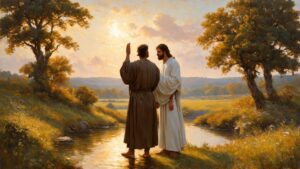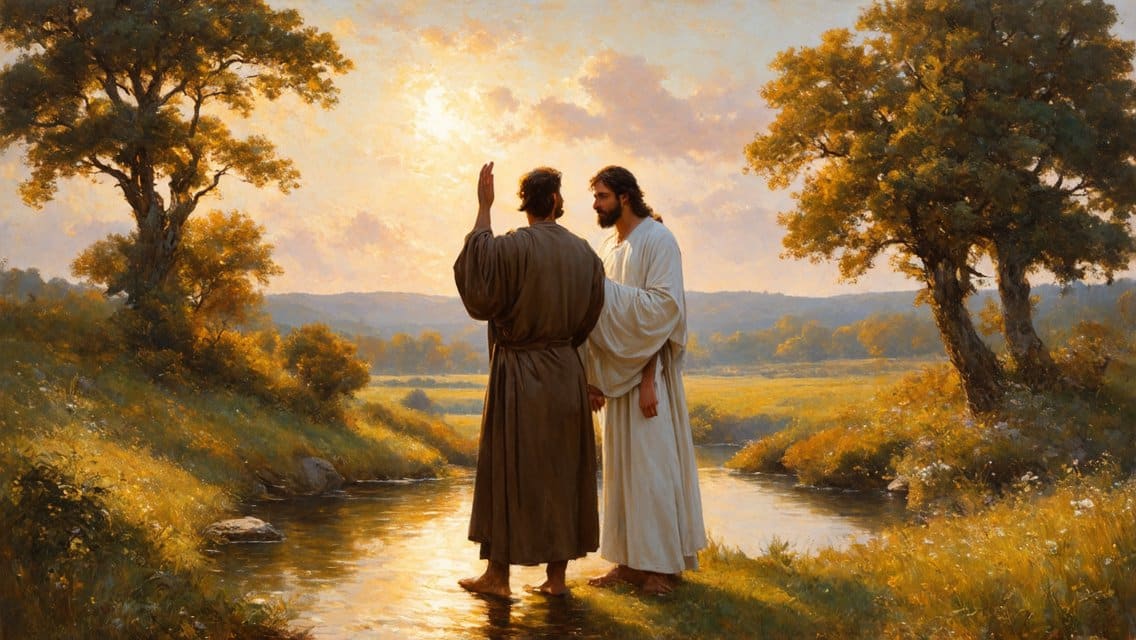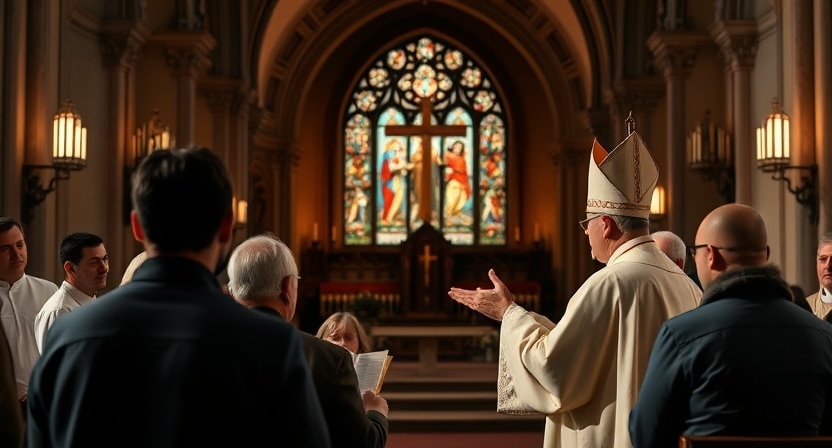THIRD SUNDAY OF ADVENT YEAR A
Preparing the way
INTRODUCTION AND CONFITEOR
In today’s Gospel we see Jesus at work: giving sight to the blind, hearing to the deaf, healing to lepers, and so on. It is a marvelous display of compassion for suffering humanity.
In this Eucharist we encounter the same compassionate Christ. Let us not be afraid to show him the various handicaps and wounds that we suffer from. [Pause].
Lord, you open the eyes of all those blinded by materialism so that they can see the invisible riches of the Kingdom of God. Lord, have mercy.
You open the ears of the deaf to the word of God, knowing that people cannot live on bread alone. Christ, have mercy.
You touch the hearts of those hardened by indifference, and help them to love. Lord, have mercy.
HEADINGS FOR READINGS
First Reading (Isaiah 35: 1-6. 10). This contains a thrilling message of hope for all those who may be feeling down. Isaiah says: ‘Cheer up! Do not be afraid. God himself is coming to save you.’
Second Reading (James 5:7-10). St James stresses something that we all find hard, namely, patience. He urges us to be patient with one another, and patient regarding the Lord’s final coming.
Gospel (Matthew 11:2-11). Jesus has tremendous words of praise for his cousin John, who is languishing in Herod’s dungeon. The Gospel also shows us Jesus at work.
1st Reading – Isaiah 35:1-6A, 10
1 The desert and the parched land will exult; the steppe will rejoice and bloom.
2 They will bloom with abundant flowers, and rejoice with joyful song. The glory of Lebanon will be given to them, the splendor of Carmel and Sharon;
they will see the glory of the LORD, the splendor of our God.

3 Strengthen the hands that are feeble, make firm the knees that are weak,
4 say to those whose hearts are frightened: Be strong, fear not! Here is your God, he comes with vindication; with divine recompense he comes to save you.
5 Then will the eyes of the blind be opened, the ears of the deaf be cleared;
6 then will the lame leap like a stag, then the tongue of the mute will sing.
10 Those whom the LORD has ransomed will return and enter Zion singing,
crowned with everlasting joy; they will meet with joy and gladness, sorrow and mourning will flee.
Responsorial Psalm – Psalms 146:6-7, 8-9, 9-10
R. (cf. Is 35:4) Lord, come and save us.
or:
R. Alleluia.
6 The LORD God keeps faith forever,
7 secures justice for the oppressed,
gives food to the hungry.
The LORD sets captives free.
R. Lord, come and save us.
or:
R. Alleluia.
8 The LORD gives sight to the blind;
the LORD raises up those who were bowed down.
The LORD loves the just;
9A the LORD protects strangers.
R. Lord, come and save us.
or:
R. Alleluia.
9BC The fatherless and the widow he sustains,
but the way of the wicked he thwarts.
10 The LORD shall reign forever;
your God, O Zion, through all generations.
R. Lord, come and save us.
or:
R. Alleluia.
2nd Reading – James 5:7-10
7 Be patient, brothers and sisters, until the coming of the Lord. See how the farmer waits for the precious fruit of the earth, being patient with it until it receives the early and the late rains.
8 You too must be patient. Make your hearts firm, because the coming of the Lord is at hand.
9 Do not complain, brothers and sisters, about one another, that you may not be judged. Behold, the Judge is standing before the gates.
10 Take as an example of hardship and patience, brothers and sisters, the prophets who spoke in the name of the Lord.
Alleluia – Isaiah 61:1 (Cited in Luke 4:18)
R. Alleluia, alleluia.
18 The Spirit of the Lord is upon me,
because he has anointed me
to bring glad tidings to the poor.
R. Alleluia, alleluia.
Gospel – Matthew 11:2-11
2 When John the Baptist heard in prison of the works of the Christ, he sent his disciples to Jesus
3 with this question, “Are you the one who is to come, or should we look for another?”
4 Jesus said to them in reply, “Go and tell John what you hear and see:
5 the blind regain their sight, the lame walk, lepers are cleansed, the deaf hear, the dead are raised, and the poor have the good news proclaimed to them.
6 And blessed is the one who takes no offense at me.”
7 As they were going off, Jesus began to speak to the crowds about John, “What did you go out to the desert to see? A reed swayed by the wind?
8 Then what did you go out to see? Someone dressed in fine clothing? Those who wear fine clothing are in royal palaces.
9 Then why did you go out? To see a prophet? Yes, I tell you, and more than a prophet.
10 This is the one about whom it is written: Behold, I am sending my messenger ahead of you; he will prepare your way before you.
HOMILY
No man ever came to prominence or achieved fame on his own. You will always find that in the background there has been a facilitator whose task was to help, guide, and encourage him – in other words, to prepare the way for him. When the person has achieved fame, the facilitator drops out of sight and is perhaps forgotten.
Nowhere is this better illustrated than in the world of athletics. When top runners are attempting to set a world record they use a runner to set a fast pace in the early laps. Such a runner is called a ‘rabbit’. The rabbit has no chance of winning the race. His task is merely to set the pace. Then he drops back, or out, and the stars take over.
Once at a big international athletics meeting, a group of top runners were attempting to set a new world record for the mile. They choose a good rabbit by the name of Jim. Jim did a super job. He didn’t spare himself. Right from the sound of the gun he went flat out. In the first two laps he set a blistering pace. Indeed, so fast did he go that he left the ‘hares’ quite a distance behind. Thus for a brief moment he enjoyed the limelight.
The stadium was filled to capacity. A buzz of excitement arose when the lap times were flashed up on the electronic scoreboard. And it was thanks to Jim, the ‘rabbit’. There he was, way out, all on his own. It was lonely out there and crucifying tough. At the start of the third lap his legs began to weaken and his lungs to give out. He glanced over his shoulder. The others were closing fast.
In the middle of the lap they went past him like a blur. In a few seconds he fell right back. The spotlight was now on the others. The rabbit was forgotten. Nevertheless, he made desperate attempts to go on. But it was too much for him. He had burned himself out. Suddenly the world went dark and his legs collapsed. That was the last thing he remembered. Hardly anybody noticed the ambulance taking him away.
He came to later in hospital. It took some time for him to realise where he was, and to remember how he had got there. But he was not concerned about himself. He just wanted to know one thing. Had they, or had they not, set a new world record? The answer was positive. On hearing it he was radiant with happiness, for it meant that all his efforts had home fruit. He had been part of something great. Were it not for the pace he set there would have been no record.
Does he not remind you of John the Baptist? John worked so hard and all the time he knew what his job was. It was to prepare the way for someone else, someone greater than he. That someone was Christ. When Christ appeared John slipped into the shadows.
John believed he had been called by God to do something great to prepare the way for the coming of the long-awaited Messiah. He knew exactly what his role was. He was only the messenger who announces the king. But he was happy to fulfil this role, and fulfil it he did to the very best of his ability. He lived for it, seeking nothing for himself – neither an easy life, the flattery of the people, nor the favour of the powers that were.
Yet, in spite of all his faithfulness, here he was languishing in Herod’s dungeon, awaiting a brutal and senseless death. He was tortured by doubts, and felt totally helpless. He felt lonely too. The crowds that once followed him now followed Christ. It was as if he were already dead. He desperately needed encouragement and assurance.
With death staring him in the face, he longed to know that he had accomplished something. There was a great void in his life. If he died now he would fall into this void. So he dispatched two of his disciples to find out if Jesus really was the Messiah. Not only the success of his mission, but the truth of his whole life, depended on a positive answer. Otherwise he would have wasted his time, and his life would lose all its meaning. And what a terrible dimension that would add to his imminent death.
The answer came back: “Tell John that the blind see, the lame walk..’ In other words, the evidence is there, so he can draw the conclusion for himself. The news must have filled John with serenity. He could now face death. His work was done. His life had not been in vain.
Christ went on to affirm and encourage John. Many people could possibly identify with John. None of us live totally for ourselves anyway. Parents, for example, live in great part to prepare the way for their children. So we have a great example of unselfish love in John. What we do for others, we do for Christ. So in that sense we. too are called to prepare a way for Christ. If there never was anyone who was prepared to sacrifice himself or herself for the advancement of another, what would the world be like?
The meaning of life is often hidden from us. This is why we need affirmation. Unfortunately we are not always good at affirming one another. We are often desperate to know if what we do, what we suffer, the sacrifices we make, etc. have a meaning. Even though we live in a world that has seen the light of Christ, we still can experience moments of darkness, doubt, helplessness, and despair. We too need to hear the words Christ spoke to John: ‘Blessed is the person who does not lose faith in me.’
Many die like John – asking if their life had a meaning. Only Christ, through his own death and resurrection, gives ultimate meaning to our life, our struggles, and our death. Let us put our trust in the words of Christ, as John did, and try to be faithful to what we see as our life’s work, however lowly and obscure it may be.
‘The whole of life is not visible to us now; on this side of death we see only one hemisphere.’ (Van Gogh).
‘If you praise success and blame failure, you will fill the world with thieves, soldiers, and businessmen.’ (Thomas Merton).
PRAYER OF THE FAITHFUL
Let us pray that, after the example of John, we may do our part in preparing a way so that Christ can come to our world. R. Lord, hear our prayer.
For the pope and the bishops: that they may faithfully watch over the flock of Christ, taking special care of the weak and the discouraged. [Pause]. Let us pray to the Lord.
For all leaders: that they may not glory in the limelight of their office but rather seek to help and serve other people . [Pause]. Let us pray to the Lord.
That the dying may experience the loving presence of Christ with them as they near the end of life’s pilgrimage. [Pause]. Let us pray to the Lord.
That we may do our work and carry out our duties faithfully and unselfishly. [Pause]. Let us pray to the Lord.
For local needs.
Let us pray:
Lord, teach us to serve you as you deserve: to give and not to count the cost, to fight and not to heed the wounds, to toil and not to seek for rest, to labour and not to ask for any reward save that of knowing that we do your holy will. We ask this through you, who live and reign with the Father and the Holy Spirit, one God, for ever and ever. ‘
SIGN OF PEACE
Isaiah said: ‘How beautiful on the mountains are the feet of one who brings good news, who heralds peace, brings happiness, and tells Zion: “Your God reigns.” ’ Lord, make us messengers of the Good News, so that we may enjoy the peace and unity of your kingdom where you live for ever and ever.
COMMUNION REFLECTION
Vincent van Gogh died at the age of thirty-seven.
The following day eight of his friends came
and decked the small room where his coffin lay
with some of his paintings.
It was only then they realised how beautiful they were.
Vincent had a very difficult life.
He knew loneliness, poverty, and mental illness,
with few friends to support him.
But now that he was dead, as often happens,
everybody was full of praise for his talents.
He once said:
‘I think that those who do not lose courage,
and who do not become indifferent,
ripen through it.
One must bear hardship in order to ripen.
Most people who know me consider me a failure.
Still, life is only a kind of sowing,
the harvest is not here.’
Today his canvasses are almost beyond price.
Yet only one of them was sold while he was still alive.
It was sold for a few hundred francs.
Vincent certainly did not reap an earthly harvest.


